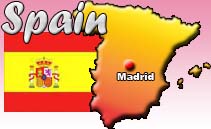"War of crucifix" questions Catholic predominance in Spain
 Madrid - A decades-old row over whether crucifixes should be displayed in public buildings in a non-confessional state has erupted again in Spain.
Madrid - A decades-old row over whether crucifixes should be displayed in public buildings in a non-confessional state has erupted again in Spain.
The recurrence of the "war of the crucifix" was seen by many analysts as partly reflecting a certain indecisiveness of the authorities caught between Spain's traditionally Catholic identity and an increasingly secular society.
When a court in the northern city of Valladolid recently endorsed a group of parents requesting that crucifixes be removed from their children's school, Prime Minister Jose Luis Rodriguez Zapatero's Socialist government appeared at a loss.
Education Minister Mercedes Cabrera said every school should decide individually whether to have crucifixes on its walls.
Yet Justice Minister Mariano Fernandez Bermejo urged the Valladolid authorities to obey the court, and the Socialist Party parliamentary group backed the removal of religious symbols from public institutions.
Traditionally, Spain has been one of the world's most staunchly Catholic countries.
Yet the church has steadily lost influence in an increasingly liberal society which no longer identifies with the sexual morals recommended by the Vatican and where immigration is spreading Islam and Protestantism.
Forty-six per cent of young Spaniards now consider themselves as agnostics, atheists or as indifferent to religion, according to a 2005 poll.
Nearly 80 per cent of Spaniards still regard themselves officially as Catholics, but less than 30 per cent of the Catholics practise the religion outside social events such as baptisms and weddings.
Zapatero's social reforms over the past five years placed the government on a collision course with the church, which slammed homosexual marriage, easier divorce and downgrading Catholic education in schools.
The conflict was deepened by the traditional opposition in Spain between the anti-clerical left and the church, which supported the right-wing dictatorship of General Francisco Franco, who ruled from 1939 to 1975.
Today's conservative politicians, however, have given only hesitant backing to the church's views, aware that fully adopting them could alienate many voters.
The election of highly conservative Cardinal Antonio Maria Rouco to head the bishops' conference has reportedly contributed to the increase of acts of apostasy.
More than 500 Spaniards informed the church that they wanted to renounce the Catholic religion in the first half of this year, up from 287 during all of 2007.
Despite such developments, the Socialists remain aware of the church's continuing influence, and have hesitated to comply with their earlier pledges of working towards the complete separation of church and state.
The church continues to receive billions of euros directly or indirectly from state coffers, government ministers swear their oaths of office on a Bible, and victims of accidents or terrorist attacks are given Catholic collective funeral masses.
Such practices are deemed offensive by Spain's more than a million Muslims, most of whom are immigrants from Morocco and other countries, and some half a million Protestants, whose ranks have been swollen by immigrants from Latin America.
About 20,000 Spaniards convert annually to religions other than Catholicism, according to a figure quoted by the daily El Pais.
The Vatican itself is trying to adapt its arguments in defence of Catholicism to a changing world, reacting to the Spanish row over crucifixes with talk about "identity" and "culture" rather than faith.
"Beyond theological or religious arguments," the crucifix was "one of the fundamental symbols containing the pain of humanity," Vatican representative Gianfranco Ravasi said. (dpa)